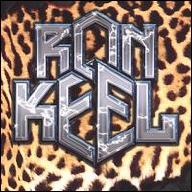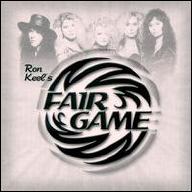The Savannah, Georgia-born Keel got his start in Tennessee with the band Lust. In 1981 he teamed up with guitarist Michael Dunigan, drummer Bobby Eva, and bassist Tim Morrison and formed Steeler. A move to the bustling hard rock mecca of Los Angeles resulted in a complete lineup change, with the arrivals of drummer Mark Edwards, bassist Rik Fox, and young Swedish guitar phenom Yngwie Malmsteen. The band was one of the first to be signed to Mike Varney's Shrapnel label (one that has since become synonymous with highly technical guitar shredders), resulting in a lone self-titled release from 1983 before their breakup shortly thereafter. Malmsteen joined Graham Bonnet's Alcatrazz for a time, and then went on to forge his own successful solo career, while Keel decided to go the Kip Winger/Bon Jovi route and start a band under his surname.
Keel drafted guitarists Marc Ferrari and Bryan Jay, bassist Kenny Chaisson, and drummer Bobby Marks, and inked a deal with AM subsidiary Gold Mountain -- the band's 1984 debut, Lay Down the Law, was issued via Shrapnel. Drummer Marks left the fold shortly after the album's release. Kiss bassist/vocalist Gene Simmons was brought in to produce Keel's sophomore effort, 1985's Right to Rock, which included the hit title cut, as well as re-recordings of three songs from the group's debut, and three cover versions of Gene Simmons demos -- the song "Speed Demon" would go on to appear in the 2002 film Men in Black II. The band used a rotating cast of drummers on the recordings, and eventually settled on Dwain Miller to replace Marks. Simmons returned to helm album number three, 1986's The Final Frontier, which included a cover of the Patti Smith Group's "Because the Night." Keel's 1987 Michael Wagener-produced, eponymous fourth studio long-player would be the last outing for guitarist Marc Ferrari, who left before the release of 1989's Larger Than Live. Featuring six new studio tracks and six older songs recorded live at The Roxy in West Hollywood, the latter LP would be Keel's last studio album for decades.
Keel's next project was the short-lived group Fair Game, which featured four female backup musicians. The project yielded a pair of singles which appeared in the 1992 science fiction spoof Bad Channels, with the complete studio sessions surfacing in 2000 via a Metal Mayhem release titled Beauty The Beast. 2000 also saw Keel form Iron Horse, a Southern rock and country outfit that released two full-length albums, Ironhorse (2001) and Bring It On (2004) before ceasing operations in 2007. The following year saw Keel (the band) reunite for a series of shows to honor their 25th anniversary, and in 2010 the band headed into the studio to record their first set of new music in over 20 years, the Frontiers Records-issued Streets of Rock Roll. Keel published an autobiography, Even Keel, in 2014, and in 2017 he formed the Ron Keel Band. The first set of new music to be released under RKB, Fight Like a Band, was released in early 2019 via EMP. 2022 saw Keel launch his own label/multi-media company (RFL Media LLC) and issue Keeled, an EP featuring re-recordings of classic '80s Keel tracks. ~ James Christopher Monger, Rovi













